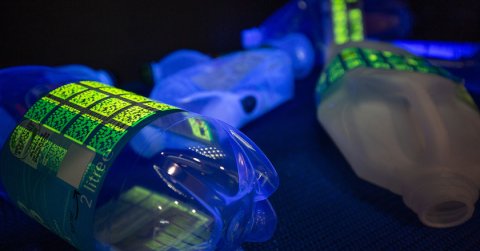
Zebra Technologies Corporation, recently announced that Polytag, a leading provider of advanced QR code and UV tag and trace solutions for circular economies, is using Zebra’s Aurora Vision Library to empower organisations to take actionable steps toward environmental accountability and circular economy goals.
One of the principal challenges Polytag addresses is tracking and capturing data from single‑use plastics. Although it may appear straightforward, the task is highly complex: plastics vary greatly in shape, colour, and size, and they are frequently mixed or compressed within recycling streams.
To overcome this, brands apply invisible UV 2D markers onto their packaging labels, which are detected using the Polytag detection units, enabling real-time identification of material origins, recycling rates, and end-of-life destinations. With the Zebra Aurora Vision Library, the system accurately processes 20 frames per second with the ability to read 2D codes on challenging high-speed conveyor lines in dimly lit facilities.
“Our mission is to give organisations the tools to make smarter, data-driven decisions about sustainability”, said Jonathan Anderson, Chief Technology Officer, Polytag. “By integrating Zebra’s solution, we’ve unlocked unprecedented precision in waste tracking, making real circularity achievable”.
Accurate, reliable and scalable with machine vision
Polytag initially relied on embedded camera systems for its proof of concept, but this approach lacked the scalability required for industrial operations. Seeking a robust alternative, Polytag collaborated with Zebra and Automatica, a Zebra Industrial Automation Partner, to significantly reduce costs while enhancing reliability and scalability.
“Aurora Vision Library offered seamless integration with our systems, allowing the capture of rich data in real time”, Anderson added. “We are transforming recycling centres by embracing intelligent operations that accelerate workflows and deliver actionable insights”.
The Polytag system reads throughout recycling centres, even on high-speed lines without the need to change vision hardware. Aurora software can operate with third-party hardware, giving users additional flexibility and backwards compatibility if needed. Even in the damp, dusty, and low-light conditions of material recovery facilities, frontline workers can accurately track waste using this solution.
Real-time dashboards help organisations monitor recycling performance by SKU and location, uncovering patterns and identifying underperforming products, like soft drinks bought in transit or shampoo bottles used in a hotel. This insight allows for targeted recycling campaigns and design strategies that guide consumer choices effectively.
“We want to drive a systematic change,” Anderson said. “That way, organisations can make more conscious decisions based on what happens to their packaging in the real world, not just what it’s made from. Zebra’s solution has been instrumental in making that vision operational.”
Achieving 100% detection rates
Polytag’s solution is already making waves in the recycling ecosystem. With Extended Producer Responsibility (EPR) regulations increasingly demanding precise data on packaging waste, Polytag’s “describe, tag, and trace” platform delivers unparalleled visibility into the recycling lifecycle.
“During research and development, we installed six units at a plant designed specifically to test and optimise new recycling technologies in a realistic environment”, said Anderson. “Powered by Zebra high-fidelity scans through the Aurora platform, we achieved an unprecedented 100% detection rate”.
This result supports organisations in meeting EPR requirements. The objective is simple: moving from assumptions to actual data that shows which products are being recycled and which are not.
“Polytag’s success is a testament to the power of asset visibility and intelligent automation powered by software”, said Donato Montanari, Vice President and General Manager, Machine Vision, Zebra Technologies. “Together, we’re solving a problem, rethinking how the world handles waste and creating new ways of working that make everyday life better for organisations, their employees, and those they serve”.
Image Credit: Zebra Technologies & Polytag





